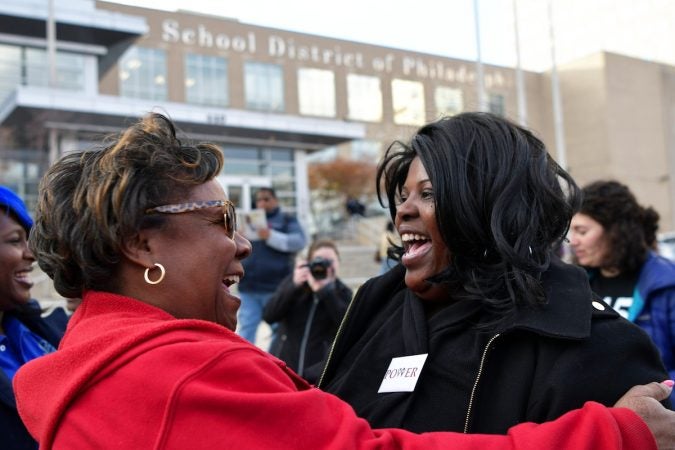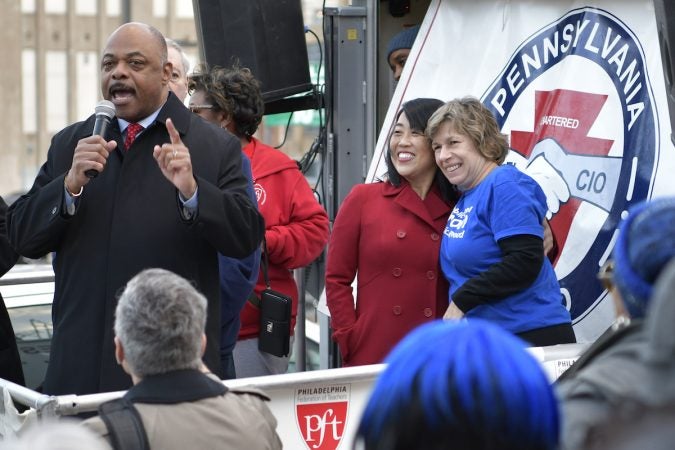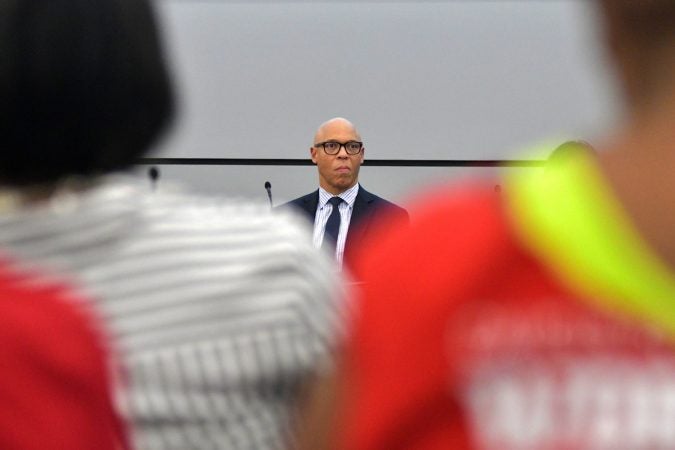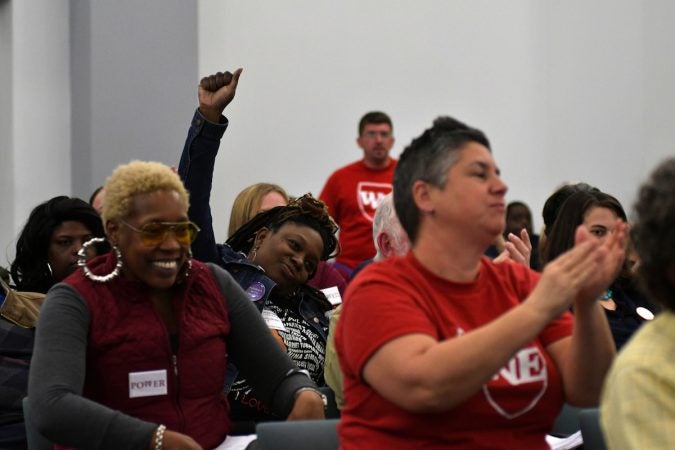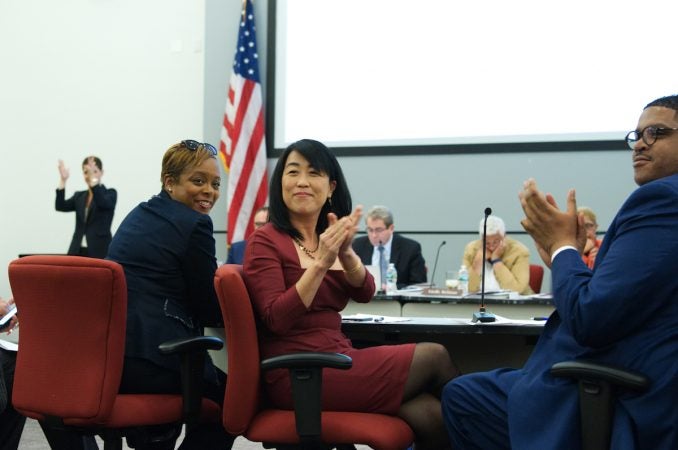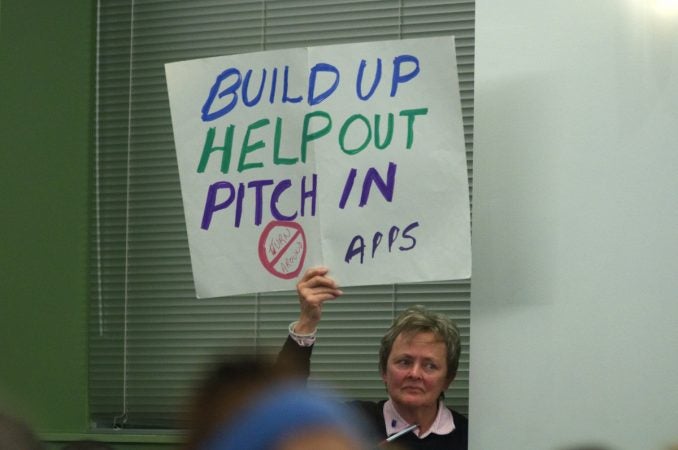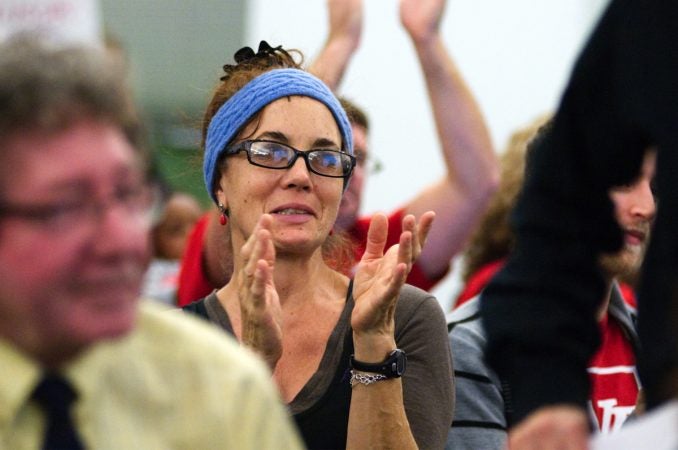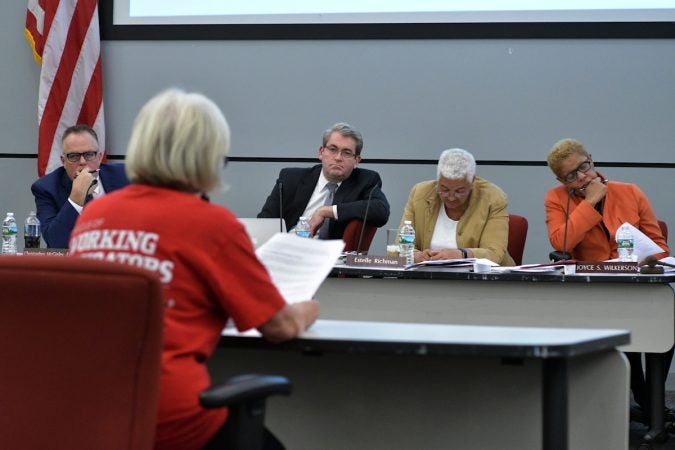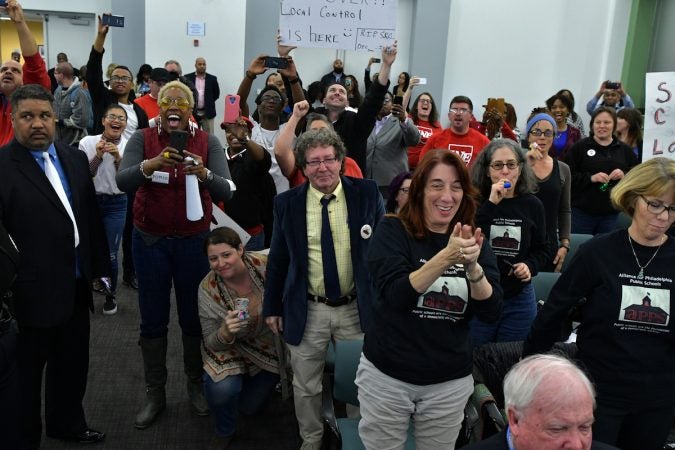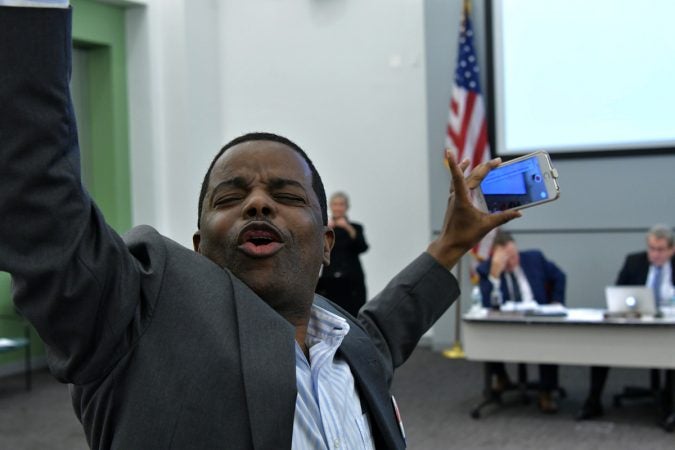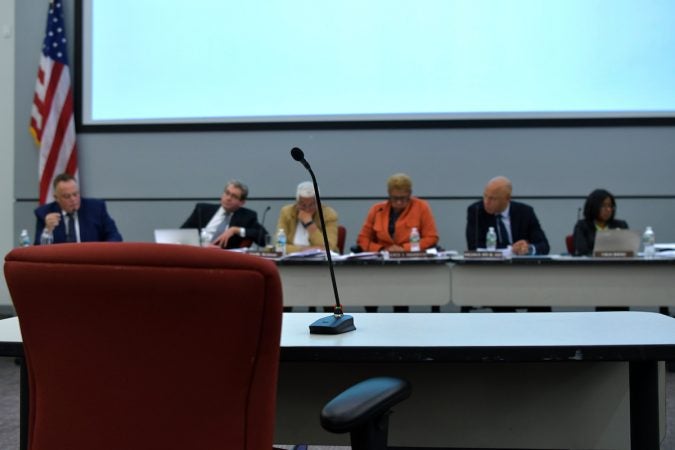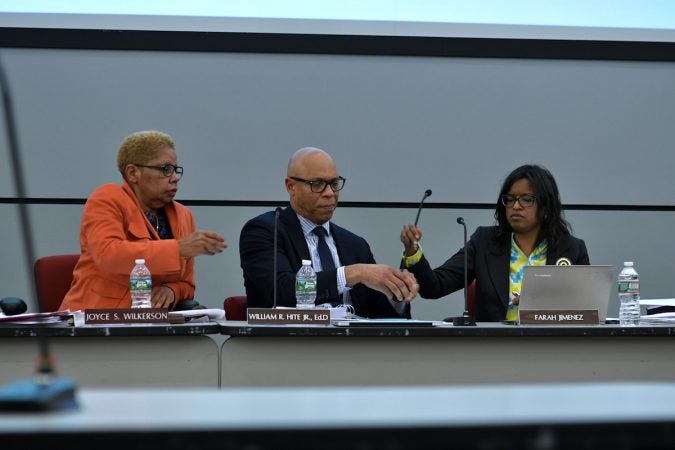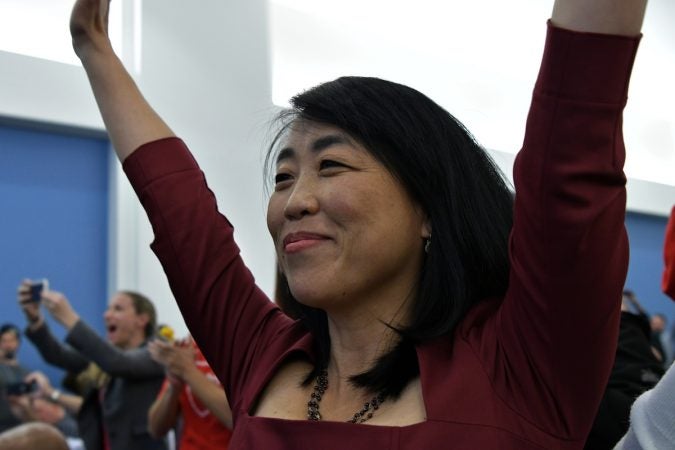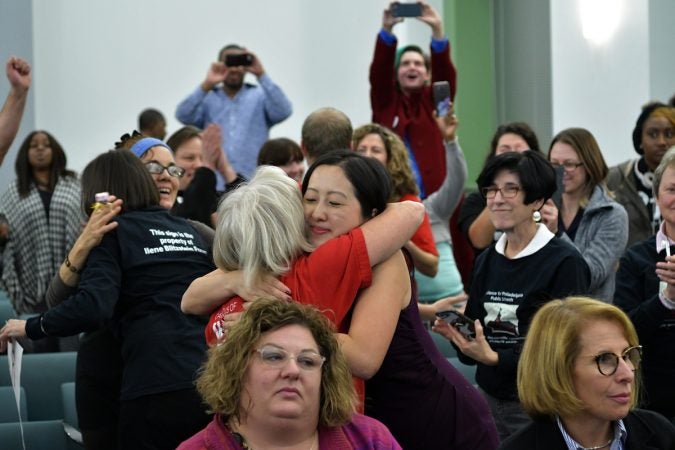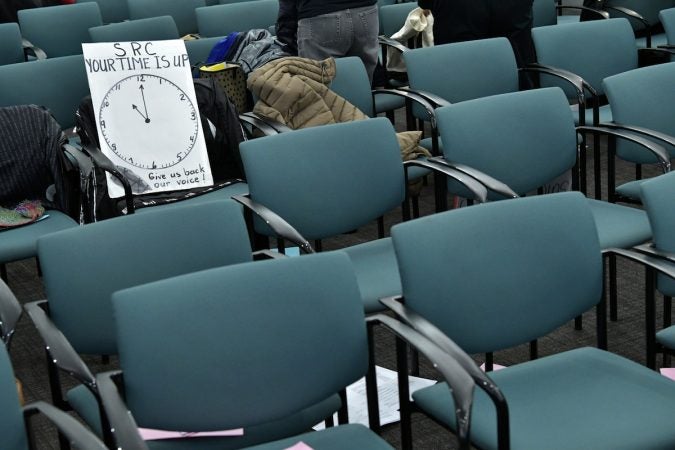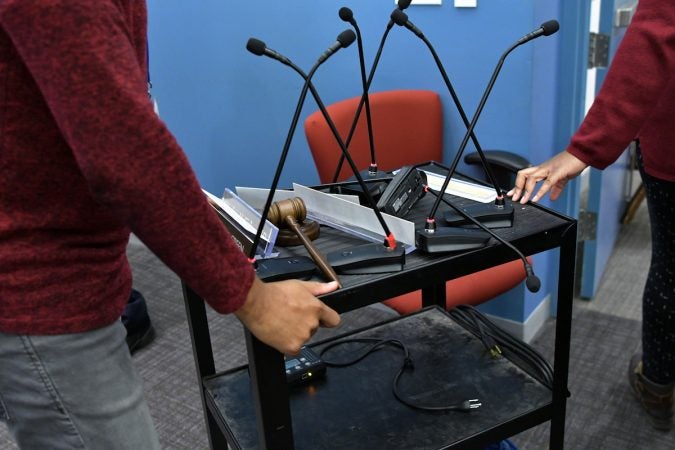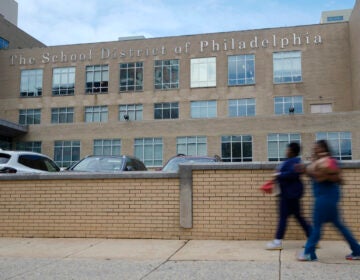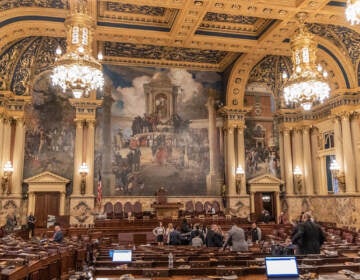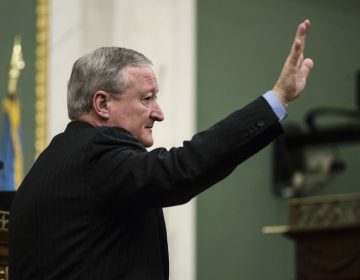SRC makes Philly education history, votes to dissolve
The much-debated School Reform Commission will likely be replaced by a nine-member school board appointed by Philadelphia's mayor.
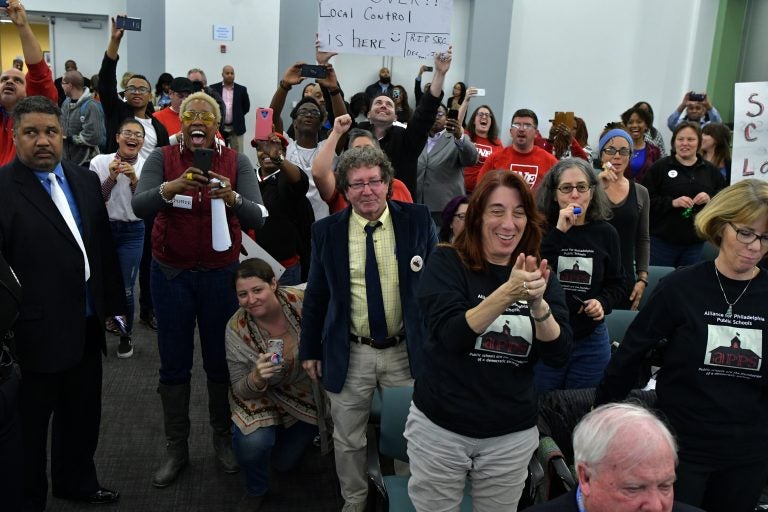
The crowd cheers as the SRC votes to dissolve itself after a marathon meeting Thursday. (Bastiaan Slabbers for WHYY)
The School Reform Commission will soon be no more.
The city’s political leaders, and SRC members themselves, yielded to years of pressure from activists — which began not long after the contentious 2001 state takeover — to cede the power to run Philadelphia’s schools back to a local Board of Education.
The process was set in motion at an SRC meeting Thursday afternoon, when the five-member body approved a resolution voting the commission out of existence.
The vote was 3-1, with one member abstaining. Chair Joyce Wilkerson and members Estelle Richman and Christopher McGinley voted yes. Bill Green voted no, while Farah Jimenez abstained. It occurred at 7:25 p.m., nearly three hours after the meeting started.
When the vote was taken, the packed room erupted in a joyful celebration, cell phones held aloft and chants reverberating: “The people, united, will never be defeated.” TV cameras also recorded the scene.
The Philadelphia Federation of Teachers brought AFT president Randi Weingarten to mark the historic occasion. The Caucus of Working Educators planned an after party at a local bar.
Under the expected timeline, the SRC will cease to exist on June 30 and a new nine-member Board of Education will be installed on July 1.
“This was never intended to be a permanent structure; it was always supposed to be an interim structure,” said Wilkerson.
“This is a big day for the District.”
Councilwoman Helen Gym, who made her reputations as an education advocate before being elected, said: “Many of us have been waiting for today for a long, long time.”
The state takeover – and the school privatization that came with it – “was a massive experiment on black and brown and immigrant children,” she said. Strategies, including charter expansion and mass closings of neighborhood schools, “didn’t solve the existing and terrible problems within the District, and they hurt far too many children.”
The public voices who opposed the takeover to begin with and whose work led to this moment “are the ones that are saving the district,” she said, to a standing ovation. “The people of this city never gave up.”
At a rollicking rally before the vote, union leaders — many of whom spearheaded anti-SRC sentiment — took a rhetorical victory lap.
“We fought using collective bargaining. We fought in the courts of law. We fought in the court of public opinion. But most importantly, we fought to make our kids have a great education,” Weingarten said.
The moment for change was ripe for other reasons besides the public pressure. Mayor Jim Kenney decided that he wanted to take on responsibility for the schools, and the district can point to improvements that put it in technical compliance with state law as no longer “distressed.”
The commission is taking advantage of a period of stability: It expects to end this school year with an $85 million fund balance. It has fulfilled all the requirements for its own dissolution, as set out in the same law that resulted in its creation.
William Hite, the school superintendent, called the action “a historic vote,” promising to “continue to advocate for the necessary resources to increase our successes, maintain our stability, and advance the positive momentum we have been able to achieve.”
Kenney and City Council President Darrell Clarke issued a joint statement: “It is our firm belief that governance by the School Reform Commission is no longer necessary … There is stability and positive momentum within the School District because local government partners are collaborating and working toward a shared vision of equitable educational opportunities for every child in Philadelphia.”
The city council is seeking a charter change so that the new board of mayoral appointees will require the body’s approval. Before the state takeover, school board members were appointed by the mayor and required no confirmation.
In a presentation, school officials laid out the reasons the district no longer needed state oversight.
Academics are showing small, but steady improvements, from rising early literacy rates to an increase in the percentage of students graduating from high school. Students’ pass rates on state biology, algebra and English tests are inching up. Teacher staffing is stable, schools are no longer qualifying as “persistently dangerous,” and fewer students are being suspended or arrested. Hite’s administration is investing in free SAT tests and more AP courses. There are nurses and counselors in every school.
The district’s financial management is sound, officials said. It is not behind in meeting payroll, it is paying its bills on time, it has a valid budget, and it has not operated with a deficit for two successive years. This is the fourth consecutive year running a small surplus, after several years of drastic cuts and struggles to make ends meet.
But looking ahead, the picture is not very rosy. Class size is still larger than in most surrounding districts, many schools still don’t have up-to-date technology, and some buildings need expensive repairs. Without new sources of revenue, the district is looking at a $701 million shortfall by fiscal year 2022, a number that is down drastically from the nearly $1 billion shortfall that was projected earlier this year.
The improvement is largely due to the successful effort to persuade the General Assembly to fix a technical glitch in the state funding mechanism that would have reduced by $250 million state reimbursements for certain district expenses after it revalued its property under the Actual Value Initiative.
After over a year of lobbying by Philadelphia lawmakers and district officials, Harrisburg lawmakers recently cemented this change by amending the state fiscal and school codes.
Uri Monson, the district’s Chief Financial Officer, said he and Kevin Geary, Chief of External Relations, collaborated with local members of the General Assembly to help enact the change. After the readjustment — which has to do with the state’s reimbursement formula for services such as school transportation — the district is in about the same financial position it was before it inked a new contract with the city’s teachers’ union.
That contract, which was significantly richer than the district had originally budgeted, put the district’s projected five-year deficit at around $1 billion. After the state formula fix, the deficit now sits just north of $700 million.
| FISCAL YEAR | ENDING FUND BALANCE (PROJECTED) |
| 2018 | $85.6 million |
| 2019 | -$22.4 million |
| 2020 | -$218.1 million |
| 2021 | -$449.7 million |
| 2022 | -$701.6 million |
Many, including Mayor Kenney, have wondered aloud in the past if the dissolution of the SRC would damage relations with Harrisburg and imperil attempts at cooperation. Monson and Geary, however, said they noticed no change in lawmaker attitudes toward the formula change, even as momentum gathered for local control.
Neither the SRC, nor the new Board of Education has taxing authority, a peculiarity that affects only Philadelphia among the state’s 500 school districts. As a result, the district has no control over its revenues, which has made planning and budgeting particularly difficult.
Some advocates said they would continue to press for an elected school board that could levy its own taxes.
SRC members, some of whom have been on the board for mere months, said this is the time to take action.
Though the district is facing future deficits, “through tough choices, increased funding from our stakeholders, establishment of a five-year budget plan and smart fiscal management, we are in a stronger positions to face these deficits than ever before,” said McGinley.
Green, who quit the city council to become chair of the SRC, disagreed. He cautioned that thinking it will be easy to keep the District financially solvent is “magical thinking.”
He recommended that the new board members insist that the city raise its share of funding to the district by $150 million for 2018-19, the equivalent of an 11 percent property tax increase. That is enough, he said, to deal with the $450 million shortfall projected through 2020-21.
“Waiting until after an election year to raise these funds, as will be the instinct, will lead to the need to raise $218 million in the 2019-20 fiscal year and deeper cuts if not raised,” Green said.
That is just to maintain the district’s current programming, not to make improvements and add programs. “To be clear, stability is not the same as additional investment,” Green added.
Green left city council when he was appointed to lead the SRC by then-Gov. Tom Corbett but removed as chair by Gov. Tom Wolf. A particular target of angry and frustrated education advocates, Green predicted that any “honeymoon” between the activists and the mayor and council “will end with demands that can’t be met and result in renewed dissatisfaction.”
Jimenez said she abstained because while she favors a return to local control, she can’t agree that the district is no longer in distress, citing the impending shortfalls.
While the district leadership “has been an exemplary steward of the limited resources it has been granted… there can also be no question that the School District of Philadelphia is in distress,” she said.
Officials laid out a detailed timeline for the transition. State Secretary of Education Pedro Rivera will need to certify the action by Dec. 31. Kenney will appoint a 13-member nominating panel by mid-December, which will recommend three names for each of the nine openings.
Kenney hopes to make his appointments by February. The new board members will spend time with the commissioners to familiarize themselves with the issues and thoroughly prepare for their duties. They will begin attending SRC meetings in March and can hold an organizational meeting before July 1.
The charter change that would add council approval to the process for naming school board members could not be enacted before May, but Wilkerson said there have been “extensive conversations” between the Kenney administration and council about how to proceed from here.
Gov. Tom Wolf did not pledge to certify the SRC’s dissolution vote, although he did, through a spokesperson, hint that his secretary of education will OK the move.
“Governor Wolf has long supported Philadelphia residents – and not Harrisburg politicians – having local control of schools,” said spokesperson J.J. Abbott. “The Department of Education will begin its review of the School Reform Commission’s dissolution request.”
Kenney and Clarke’s statement urging a vote to dissolve the SRC noted that the city cannot rely on the state for significantly more funds, since it has its own fiscal challenges, including lower credit ratings brought on by its budgeting practices. The General Assembly passed a budget without the revenue to pay for it.
“While we refuse to let the General Assembly off the hook for providing the thorough and efficient education required under the Pennsylvania Constitution, we also know we must face the reality that they have consistently proven unwilling to face that responsibility,” their written testimony said. “In the meantime, we understand that Philadelphia must make the sacrifices necessary to provide the resources all students in Philadelphia schools need to succeed. For that reason, we believe the time to dissolve the SRC and to reclaim local authority over the School District is right for all funding partners, including the General Assembly.”
Like Geary and Monson, they maintain that the SRC dissolution “will strengthen the existing partnership between the Commonwealth, City, and District” rather than cause Harrisburg to write off the city schools entirely.
They also note that a fair funding lawsuit awaits a hearing before the state Supreme Court, and say local control “will also allow our City government and School District to join forces with districts and municipalities across the Commonwealth that are pushing for equitable and apolitical school funding reform.”
Kenney and Clarke concluded: “The time is right to return the School District of Philadelphia to local control and accountability.”
State Sen. Vincent Hughes said that the task ahead is still “to force the Commonwealth to fund education fairly and equitably regardless of race or geography.” He noted that his legislative district stretches from Philadelphia to wealthy suburban areas, with “12 kids in a class, flat-screen TVs with a weather center… I see visibly what is available to children less than two miles outside the Philadelphia county line.”
Invoking names like Ruby Bridges and Thurgood Marshall and their work to desegregate schools, Hughes said school funding is a civil rights issue, and the task is “to force others to realize that commitment, equitable funding and adequate funding to create 21st century schools.”
Wilkerson said that she was “excited” by the city’s assumption of local control and by a new level of cooperation between the city and district, because “nothing is more important to a strong Philadelphia” than a good education system.
“It has been an enormous challenge moving the needle in the School District,” said Wilkerson, who worked in Mayor John Street’s administration when the state takeover occurred.
But she also noted that there are big challenges ahead. “None of us is deluded that by changing governance we are going to change things overnight,” she said.
Contrary to the tense tone that typically reigns at such gatherings, Thursday’s SRC meeting had a carnival atmosphere. Anti-SRC advocates rejoiced openly throughout the session, and many ceded their allotted speaking times in order to speed through the comment period of the meeting and get to a final decision on the SRC’s fate.
At one point they simply chanted:
“Vote! Vote! Vote!”
WHYY is your source for fact-based, in-depth journalism and information. As a nonprofit organization, we rely on financial support from readers like you. Please give today.




